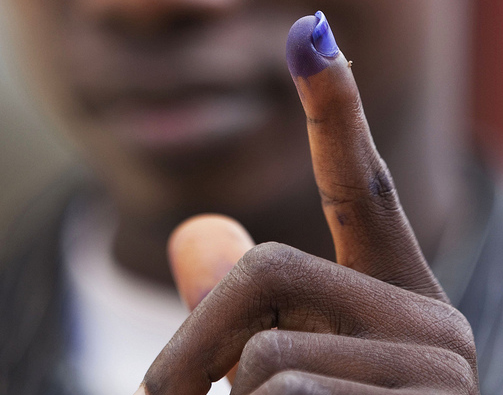
Some degree of controversy is almost inevitable at the annual announcement of perhaps the most prestigious prize in the world. The awarding of this year’s Nobel Peace Prize to three women’s rights activists is an undoubtedly appropriate recognition of the role of women in peace building. But opponents of Liberia’s incumbent president, joint-winner Ellen Johnson Sirleaf, claim that the prize is politically motivated and interferes with domestic politics. With the first round of presidential elections — in which Sirleaf is seeking re-election — taking place only days after the announcement, they fear the timing of the prize for Africa’s first elected female head of state could unfairly boost her prospects.
Whatever. As Liberians go to the polls today, the Nobel Peace Prize is hardly the main reason the international community is watching so closely, and apprehensively. With the images still fresh in our minds of the post-election violence in the Ivory Coast last year (in which Liberians were involved), these second elections since the end in 2003 of decades of civil war are an important test for Liberia’s fragile peace. If the presidential and legislative elections are conducted successfully, i.e. without major incident, then pressure will mount on the UN peacekeeping mission to withdraw. This will no doubt be a delicate undertaking in a country where the presence of international security forces has long been the main guarantor of peace.
Needless to say: while elections set the political stage for the coming years and are an important indicator of the nation’s stability, they are no short-term remedy for any of the structural challenges Liberia faces. As in most other post-conflict environments, Liberia’s elected elite will face daunting challenges: fighting endemic corruption, rebuilding faith in political and security institutions, addressing infrastructure problems and developing the health and education systems, to name just a few.
For a wealth of background information on Liberia’s many challenges, and on the country’s political past and future, check out the Liberia keyword in our Digital Library. Below are some highlights:
 |
Building the Future: Democracy and Change in Liberia In this ISN podcast, Ellen Johnson Sirleaf’s long-standing rival and main challenger Winston Tubman candidly discusses the dynamics of running for office in Liberia. The former UN diplomat and legal expert talks about his reasons for teaming up with ex-football star George Weah, and strongly criticizes Sirleaf’s decision to run again for the presidency, recalling that Liberia’s post-war Truth and Reconciliation Commission had implicated her in the civil war and recommended she be banned from public office. |




